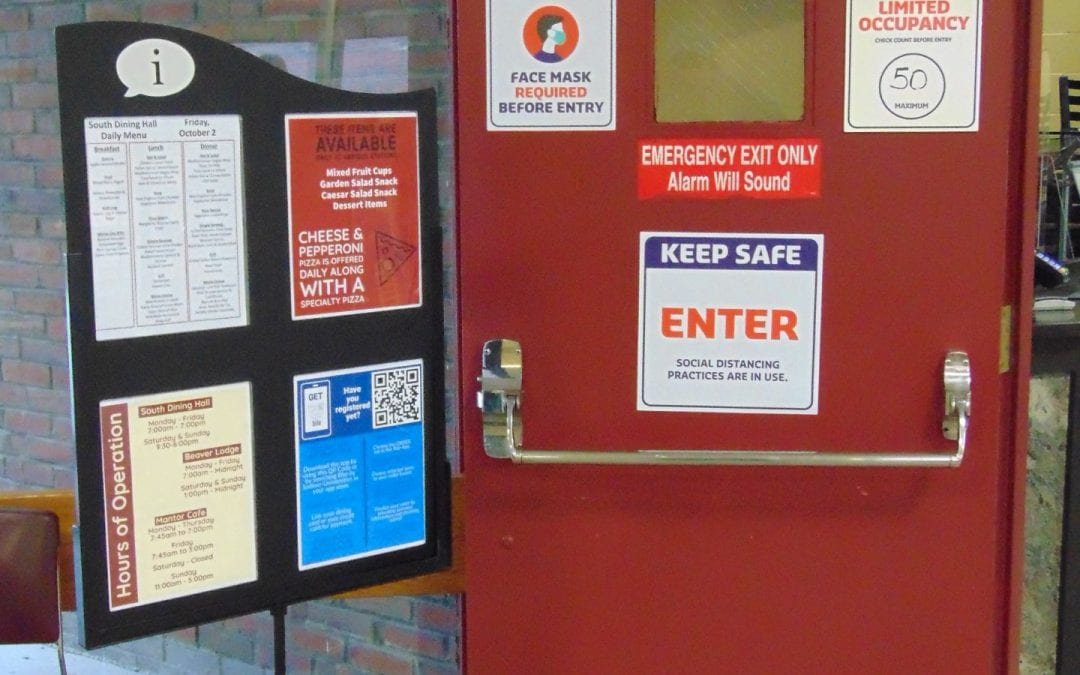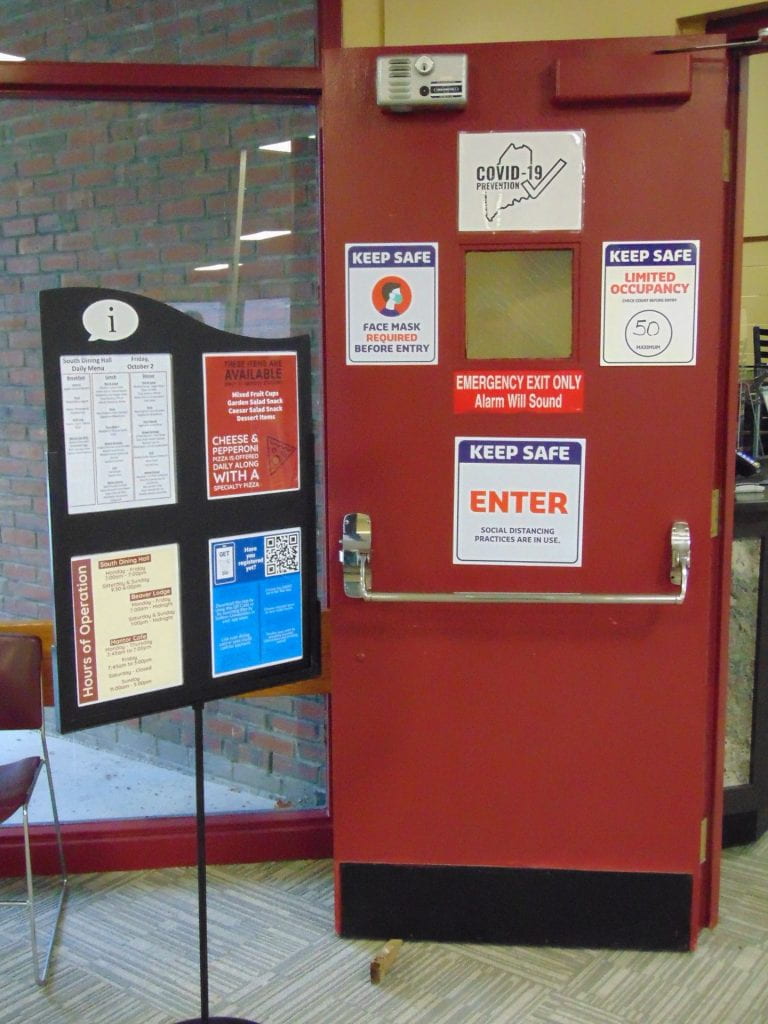Oct 13, 2020 | Feature |
by Malcolm Langner, Contributing Writer
Due to the changes across campus from COVID-19, UMF students and professors are trying to stay optimistic despite not fully knowing how next semester will unfold, especially with classes.
One of the aspects that might cause challenges is online vs. in-person classes. “It is more of a matter of being prepared to have the courses work differently for me rather than writing the syllabus differently. One big change is being ready to have more tests be take-home tests,” said James Melcher, Professor of Political Science at UMF.
The changes which surround the UMF community during the pandemic expand further than physical challenges, but into emotional stress. “It’s stressful, and knowing it is for my students as well, also adds to my stress,” Melcher said. “I have a tendency to worry sometimes, and I don’t enjoy having this much uncertainty around these things.”
Melcher doesn’t plan on letting these uncertainties disrupt him from his classes, “I try to be in command enough that my students can rely on me.”
Despite the possible hardships next semester, Melcher believes in the UMF system. “I think there is a good chance the University [of Maine] System will have a plan by then, said Melcher. “However, pandemics are unpredictable, and we have to be ready to respond if an outbreak happens.”
Melcher continued to say that the use of Brightspace this semester could pay dividends in next semester. “I have worked hard to learn Brightspace this summer and fall; if we go online again, knowing that new system will be more crucial than ever,” said Melcher.
Melcher noted that the changes this semester have even extended into his home. “The single biggest piece of prep I have done was to improve my home internet service this summer,” said Melcher. “It had worked very poorly in handling the demands of teaching online last spring.”
The uncertainty of going online is voiced by students as well. Cooper Millet, a junior at UMF, is finding that signing up for classes next semester is more challenging than ever. “It’s very frustrating not knowing what next semester will look like.” Millett said. “I am definitely an in-person learner, and not knowing whether or not I will be at my best for my classes is concerning.”
Due to COVID-19, students have to take into account new aspects of a class before signing up, “I can’t look at my requirements and just sign up for classes. Now, I have to really understand the difficulty of it and make sure I would be able to understand the subject without an in-person professor,” Millett said.
As for on-campus living, Millett can only hope for the best. “I love living on campus.” Millett said. “Not knowing whether or not I will be back here with my friends is more than unnerving.”
For Millett, this uncertainty expands even further. “I play baseball. I would be very disappointed if we don’t have a season for the second year in a row,” he said.
While slightly discouraged by the situation, Millett understands that precautions come first. “COVID-19 has been unstable, and trying to allow too much on campus could definitely make things worse.”
Despite next semester appearing to be hazy, Millett remains positive. “I love it here,” he said. “I think UMF has done a great job with everything so far and will continue to be a fun, safe place next semester as well. We don’t really know much about next semester, so all we can do is wait it out.”
Oct 13, 2020 | Feature |
by Bella Woodhouse, Contributing Writer
October has officially arrived at UMF. The leaves are turning, classes have been in session for a month, and pre-registration is creeping up on students.
Pre-registration, which started Oct. 5, is a required process every semester that prepares students to sign up for classes for the next semester. Students use Schedule Planner and MaineStreet to plan and put their potential classes on their Wish List before getting approval from their academic advisor.
Despite more restricted limits to how many students can be in a class and a lot of classes being online, the process will be essentially the same, but advisor meetings have been and will take place on Zoom. “I think there has been a lot of creative thinking about how to still hold classes,” said a UMF faculty member who wished to remain anonymous. “There are a limited number of traditional, fully face-to-face classes, but there are not fewer classes overall; students still have a variety of classes to choose from. They just need to be flexible about how they are offered.”
This year, professors must decide on whether they will offer their class asynchronously (students complete work at their own pace), synchronously (students meet online with professor all at once), or even half in person half asynchronously.
Due to the pandemic, the maximum amount of students that can be in a class has decreased, creating more stress than usual for students registering for classes. “As is always the case, I think some students won’t get the classes they most desire because they will fill up,” said the faculty member. “I think some students will struggle to find the courses they need that fit into a good schedule for them…I also imagine that some students who are looking for only one type of instruction (i.e. only face-to-face or only remote or only hybrid) might struggle. I feel like flexibility has to be the name of the game this year for everyone!”
Pre-registration is just beginning and students are now concerned about what registration for the upcoming semester will resemble. “When the school year started I didn’t even think about pre-registration and now that it’s here I am worried I won’t be able to get the classes I need,” said Victoria Garand, a sophomore majoring in actuarial science. “I don’t mind online classes, but I miss being in person and my major makes online learning difficult.”

Oct 13, 2020 | Feature |
by Brittney Lee, Contributing Writer

The Landing has been a staple venue for student-lead events on campus.
Photo courtesy of Sam Shirley.
The Landing has been the small event venue at UMF for years, but COVID-19 has had a significant effect on the traditional weekly happenings this semester.
Throughout the years, The Landing has been a staple venue for student-lead events on campus. Events such as mug painting, tye-dying, and many others have been held in The Landing as a way for students to participate on campus when classes aren’t in session.
Before the pandemic hit, students were able to freely go to these events without worrying about social distancing guidelines or wearing a face covering. In previous years, The Landing also had couches and chairs throughout the entire room. However, that’s not the case this year because the entire layout of the room has gotten a makeover in order to abide by the schools social distancing guidelines.
Going forward, the events and their safety precautions are set to stay consistent. The events have been reported to be going very well. “When I attended an event [at The Landing] students seemed to have easily followed the social distancing requirements and everyone was cooperative for the most part,” said Harley Carter, a second-year student.
This year the student-lead events have been occurring rather regularly and have had great student attendance. These happenings have been held on some weekends and most weeknights as a way for students to take a step back from their coursework and enjoy a stress-free evening. However, it’s hard to ignore the impacts the new changes to The Landing have made on how events are led.
Students are enjoying the events and have thought of them to be a “great way to deal with the new world we live in today,” says Carter. Some students mentioned that with the stress of the new school year, these events have been a positive distraction.

Oct 13, 2020 | Feature |
by Nevaeh Rush, Vice President
The changes in the dining hall on campus due to COVID-19 have left the majority of students unsatisfied with their meals and wanting more for the price of their meal plans.
With new regulations on campus, the cuisine at UMF has vastly changed. South Dining Hall has been changed to a buffet style where students take their food and leave. “You walk in and tap your dining card,” said Sophomore Julia Partridge, “It only goes one way, and you have to grab food items through the line.”
There are 50 people allowed to be in the South Dining Hall at one time, leaving students feeling rushed as they go through the line. Sophomore, Emily Thompson said, “If you forgot to grab something and you passed it, forget about it.”

New signage posted outside the new entrance of the dining hall, changed due to COVID-19.
Photo courtesy of Sam Shirley.
Having unlimited swipes comes in handy for those students who feel that the lack of options is a greater problem this semester than it has been previously. “I find it harder to eat healthy,” said Partridge. “There are less healthy options and the ones they do have often do not taste good,”.
Senior, Thomas Watson struggles in particular with the options in the dining hall this semester. Watson struggles with Celiac disease, a hypersensitivity to gluten. This limits many of the options for him to eat in the dining hall. “I am basically limited to the gluten free sandwiches or the simple servings,” Watson said. “And the simple servings happen to be closed on the weekends.” All of the prepackaged food is already out for the day, therefore often the gluten free sandwich options he is limited to are gone by the end of the day.
“I do believe that I have the option to call ahead an hour or more and ask them to prepare me something gluten free.” He said. Although that is a better alternative some days, it is not always convenient in the uncertainty of a college student’s busy schedule.
Watson as well as Thompson, both having the highest meal plan (meal plan A), voiced their concerns about spending their own money on top of the meal plan cost due to being simply unsatisfied with the food. “I am a picky eater,” Thompson said. “There often are not many options I will eat.”
“I wouldn’t call it a need to technically, there are the things in the dining hall that are needed for survival,” Watson said. “But I am finding myself spending more on outside food than I normally had.”
Yet there are some benefits with the new system, “I have been sick less from cross contamination of gluten products,” Watson said, “because everything is now packaged separately.” Many students are also enjoying the new eating areas on campus, such as the Mantor Green. “It is nice to sit outside and eat when it is nice out,” Watson said.
“It is a necessary evil,” he said. “The dining hall is doing what they have to to be open.”

Oct 13, 2020 | Feature |
by Emily Cheney, Contributing Writer
As campus life adjusts to the new policies, local businesses and restaurants downtown are also struggling to handle the new modifications.
When COVID-19 first hit, businesses began to shut down in order to stay safe. The Homestead, a local business located in downtown Farmington, has been one of many local businesses that has adapted to the pandemic lifestyle.

The Homestead in downtown Farmington.
Photo courtesy of Sam Shirley.
Kyra Zabel, a fourth-year student at UMF, has been working at The Homestead for two years and describes her struggles. “We closed for a couple months so I was technically out of a job, but when we got back, I was working more than before we closed,” Zabel said. “I had more time and a lot of the staff left because they lived on campus and went home. I was going in at 11:30 and working until close frequently, which is a lot of being consistently on your feet.”
Between trying to keep everything clean and the customers happy, dealing with backlash is inevitable. “Most of our customers are really respectful, but especially during lunch, there are always people who feel the need to complain and make comments about having to wear a mask,” Zabel said.
Working in any sort of local business has become significantly stressful during these past months. For restaurants, employees are much more attentive, working with food and constantly cleaning tables, one after the other, “To maximize time before, we used to be able to have all of our tables close to each other, but now we have to sanitize and wash our hands in between people, and it’s so much more time-consuming.” Zabel said.
Looking from the customer’s perspective, Farmington resident Emma Petersson shared her recent experience with dining at the Homestead. “Besides the extra sanitation precautions, I cannot say that I noticed a difference in how things are run,” Petersson said. “I would definitely say they are more on top of things as the dining area is more spread out and staff is enforcing and maintaining strict sanitation practices.”
The tables are already spread out making social distancing easy to maintain for those who are dining. “The staff has been very kind and considerate, but firm with boundaries,” Petersson said.
Though Zabel said that she has dealt with some very rude customers who complain about wearing masks, Petersson said that from a customer’s point of view, she did not see anyone being insolent about masks while she was there. “I didn’t interact with other customers, but they were all wearing masks when walking to or from their table which I appreciated,” said Petersson.




